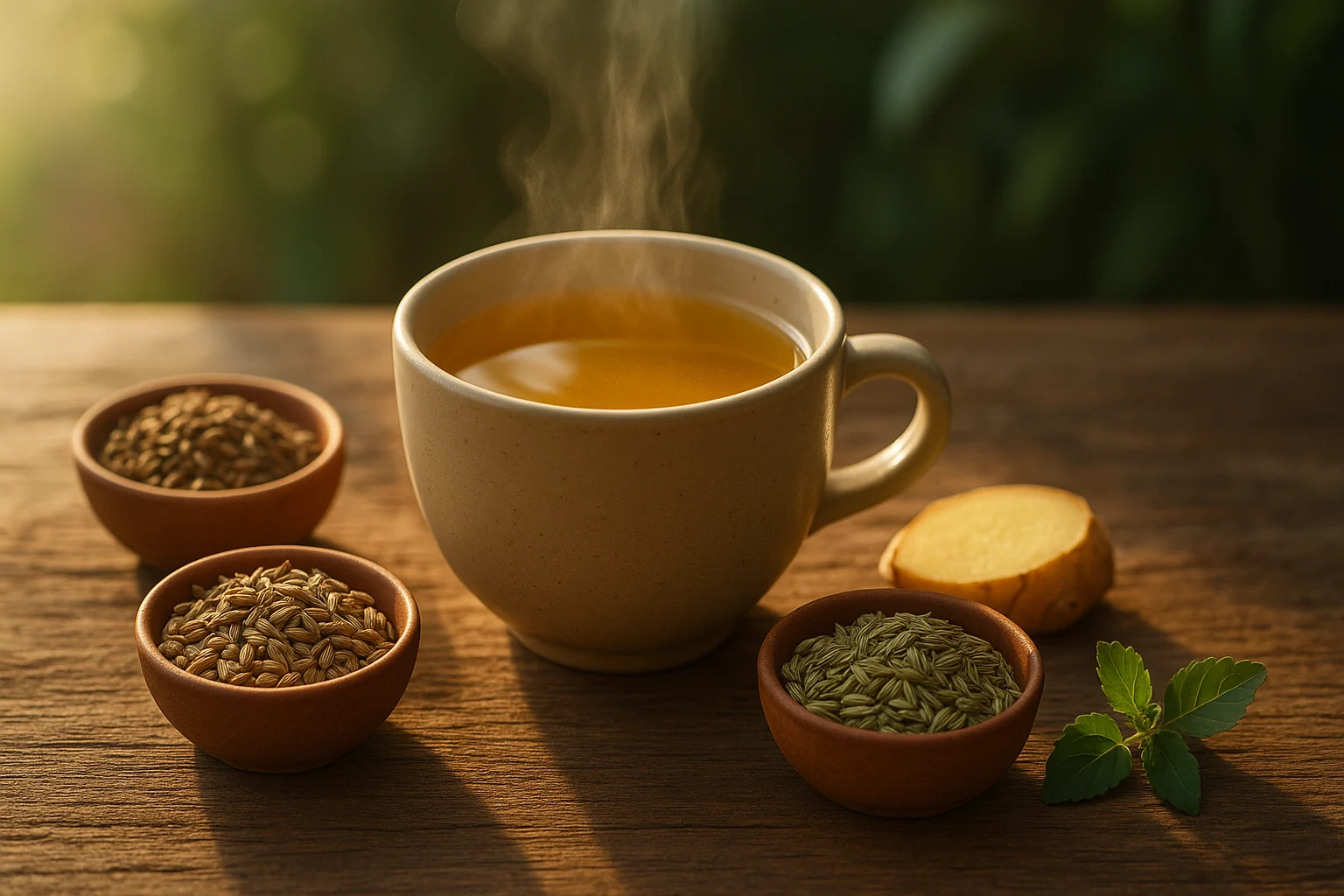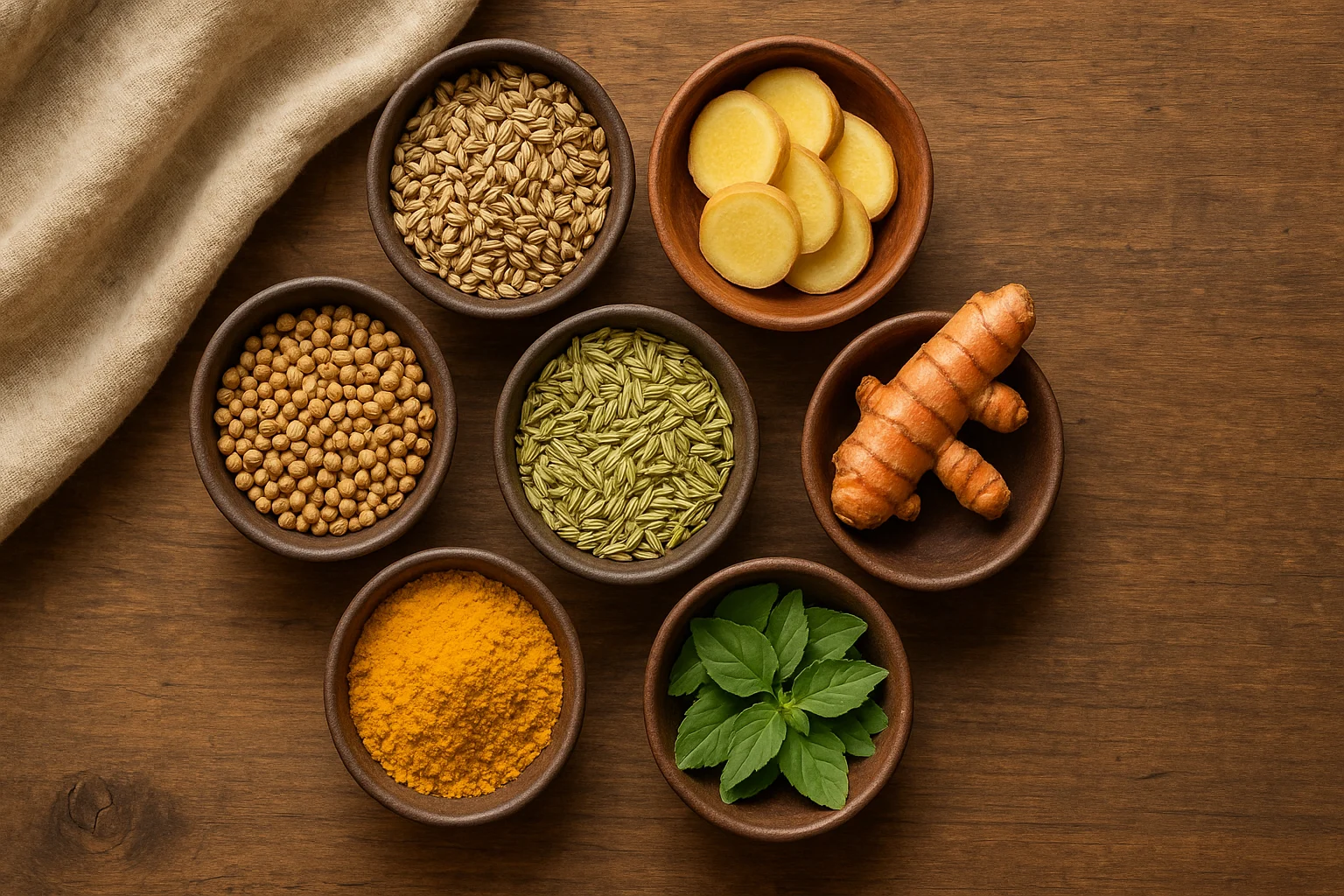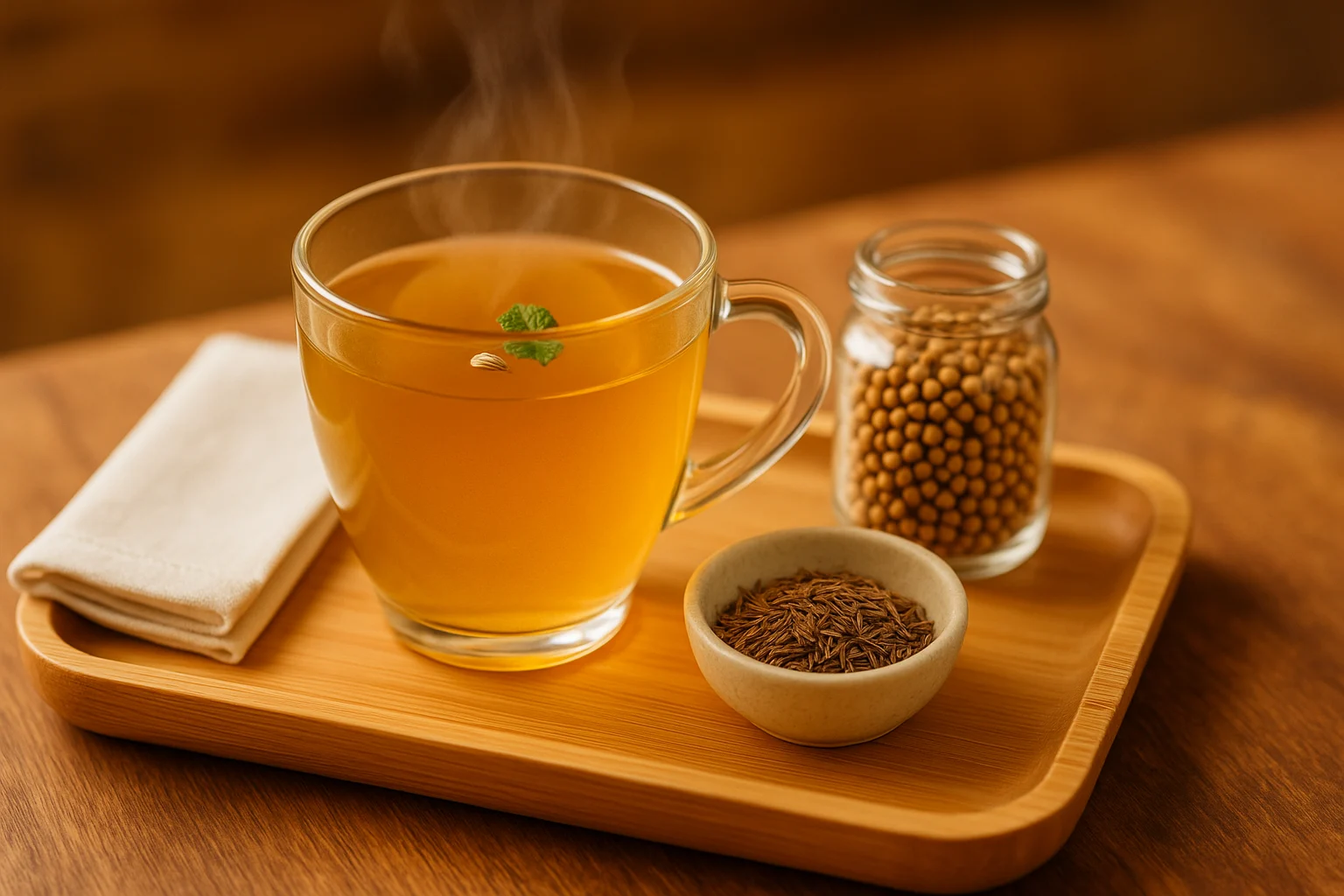
Feeling sluggish or a little foggy? That’s when I brew a cup of Ayurveda detox tea. It’s warm, a touch spicy, and—somehow—clears my head better than coffee. After too many takeout nights it became my reset for mood and digestion. Want the bigger picture of Ayurveda? Explore our guide on Ayurvedic daily practices.
Start Your Tea Journey!This page contains paid/affiliate links. As an Amazon Associate we earn from qualifying purchases, and we may earn commissions from other partners—at no extra cost to you. Links marked with ‘#ad’ are affiliate links, meaning we may earn a commission at no extra cost to you. Learn more.
Table of Contents
Detox Tea Benefits: What You’ll Really Notice
- This tea gently gets digestion moving, supports your body’s natural elimination processes, and steadies my energy.
- Simple spices like ginger, fennel, and cumin do more than flavor — they keep my gut happy.
- Customizing it for Vata, Pitta, or Kapha makes the benefits feel surprisingly personal.
- Brewing’s quick: a handful of spices, some boiling water, and you’re set.
- Daily sips have helped my digestion feel smoother, my skin look clearer, and even helped me relax.
What is Ayurveda Detox Tea?
In our hectic world, “detox” often means grueling juice cleanses or restrictive diets. But an ayurvedic cleanse tea? It’s a gentle way to support your digestion. No starving—just simple ingredients delivering detox tea benefits that may help you feel balanced with steadier energy.
Ayurveda, India’s ancient wisdom, is all about aligning with nature to feel your best. I started sipping this tea after too many takeout nights, and it seemed to help my digestion move more smoothly while easing that sluggish feeling. Unlike harsh store-bought teas, it’s perfect for daily use and helps me feel lighter and more refreshed every day.
Here’s what I’ve noticed since drinking it:
- My digestion wakes up gently in the morning — a lot nicer than the jolt from coffee.
- I don’t feel as heavy or tired after meals, and even my skin looks clearer.
- I notice fewer energy dips — the herbs feel gentle and don’t add caffeine.
- Depending on my mood, it even seems to calm that restless Vata energy I sometimes get.
- A mug of warm, spiced water feels like a small act of self-care.
For me, cleansing is about care—not force.

The Power of Ayurvedic Herbs: Your Kitchen’s Magic
Chances are your spice rack already holds the herbs for this tea. They’ve been used for centuries and still earn their place today. For a deeper dive into benefits, see our guide on the best Ayurvedic teas for wellness. Here’s my take:
Ginger Benefits
Ginger’s my go-to—it gets my digestion moving and calms my stomach fast. A 2019 study in Phytotherapy Research says it fights inflammation too, so I always add a slice to my tea.
Fennel: A Star Ingredient in Herbal Detox Tea
Fennel tastes mildly sweet and cooling. I reach for it when I’m puffy or gassy because it tends to keep digestion moving comfortably.
Cumin Benefits
Cumin often plays nice with meals—warm, earthy, and easy to drink—and may support nutrient absorption and the body’s natural cleansing.
Coriander Benefits
Coriander leans cooling and gentle; I use seeds (or a few fresh leaves) when indigestion or acidity flares.
Tulsi Benefits
Tulsi, the “Queen of Herbs,” is my stress-reliever. Its bold flavor may support immune function and can help with feelings of congestion. Learn more about its calming effects in our Tulsi tea benefits guide.
Cardamom and Turmeric Benefits
Cardamom can help with bloating and keeps breath fresh, while a pinch of turmeric has been studied for anti-inflammatory properties; evidence for direct liver benefits in humans is limited, so enjoy it as a flavorful addition. Combined, they create a warming herbal detox tea that supports both digestion and vitality.
Understanding Your Dosha: Personalize Your Tea
How to Identify Your Dosha
Not sure about your dosha? Ayurveda says we’re all a mix of Vata (air/ether), Pitta (fire/water), or Kapha (earth/water). Try a quick quiz at Banyan Botanicals or our own Ayurveda doshas quiz to find yours. Vata folks might feel anxious or bloated, Pitta types get hot or cranky, and Kapha people feel sluggish. Knowing this helps you tweak your tea.
Each dosha has its own energy, so customizing your cup makes it even more effective. Here’s how:
| Dosha | Characteristics | Tea Focus | Best Herbs |
|---|---|---|---|
| Vata | Dryness, anxiety, bloating | Warming, grounding | Ginger, cinnamon, cardamom, tulsi |
| Pitta | Inflammation, acidity, irritability | Cooling, calming | Fennel, coriander, mint, rose |
| Kapha | Sluggishness, congestion, weight gain | Stimulating, warming | Ginger, black pepper, cinnamon, tulsi |
Ayurveda Detox Tea Recipes: Your Home Brew Guide
Ready to brew? These Ayurvedic detox tea recipes are straightforward and reliable. Organic spices tend to taste brighter.
CCF Tea Recipe: Daily Digestive Elixir
If there’s one recipe I return to, it’s the classic ayurvedic cleanse tea—often called CCF tea. It’s simple, gentle on the stomach, and somehow the right choice no matter how I’m feeling.
Benefits: May support digestion, reduce bloating, and support nutrient absorption; it may also support the body’s natural elimination processes.
Ingredients:
- 1 tsp organic whole cumin seeds
- 1 tsp organic whole coriander seeds
- 1 tsp organic whole fennel seeds
- 4-5 cups filtered water
- Optional: A thin ginger slice, pinch of rock salt, or a squeeze of lime/lemon juice.
Instructions:
- Lightly crush seeds to release their oils.
- Boil water in a saucepan.
- Add seeds and optional ginger.
- Simmer, covered, for 10-15 min.
- Strain with a fine-mesh tea strainer and sip warm throughout the day.
Pro Tip: Brew in the morning and keep it warm for all-day sipping—an insulated bottle makes it effortless.
Quick-start pick — Yogi DeTox Tea Bags: no-prep, caffeine-free way to try a daily cup.
If measuring seeds feels like a hurdle, start with a simple steep and build the habit first.
Prefer the classic DIY route? Try Banyan Botanicals CCF loose blend for that traditional cumin–coriander–fennel brew.
Vata-Balancing Detox Tea Recipe
This cozy tea calms Vata’s airy, scattered energy, easing bloating and nerves.
Benefits: May ease nervous energy, warms you up, and keeps digestion flowing comfortably.
Ingredients:
- 1-inch piece fresh ginger, sliced
- ½ tsp organic cumin seeds
- ½ tsp organic fennel seeds
- ¼ tsp organic black peppercorns
- 1-2 organic tulsi leaves
- 4 cups filtered water
- Optional: A pinch of jaggery or splash of almond milk.
Instructions:
- Boil water.
- Add ginger, cumin, fennel, peppercorns, and tulsi.
- Simmer, covered, for 10-15 min.
- Strain, add sweetener if desired, and sip warm.
Pitta-Balancing Detox Tea Recipe
This cooling tea can be soothing for Pitta’s fiery side and may ease feelings of heat and acidity.
Benefits: May ease feelings of heartburn, calm skin discomfort, and promote a sense of ease.
Ingredients:
- 1 tsp organic coriander seeds
- 1 tsp organic fennel seeds
- ½ tsp dried mint or fresh mint sprigs
- 2-3 organic rose petals
- 4 cups filtered water
- Optional: A cucumber slice or splash of lime juice.
Instructions:
- Boil water.
- Add coriander, fennel, mint, and rose petals.
- Simmer for 8-10 min.
- Strain and sip warm or at room temp.
Kapha-Balancing Detox Tea Recipe
This zesty tea may help lighten Kapha’s heavy, sluggish feel and support a sense of energy and clarity.
Benefits: May support metabolism and help with feelings of congestion; any changes related to weight are most likely when paired with balanced habits.
Ingredients:
- 1-inch piece fresh ginger, sliced
- ½ tsp organic black peppercorns
- ¼ tsp organic cloves
- ¼ tsp organic cinnamon stick pieces
- 1 organic tulsi tea bag or ½ tsp dried tulsi
- 4 cups filtered water
- Optional: A squeeze of lemon juice.
Instructions:
- Boil water.
- Add ginger, peppercorns, cloves, cinnamon, and tulsi.
- Simmer for 15 min.
- Strain and sip warm.

Incorporate This Tea into Your Daily Routine
I make this ayurvedic cleanse tea part of my day without much effort. My simple routine looks like this:
- Morning Kickstart: I sip a warm cup to get my digestion going before coffee. ☀️
- Between Meals: I drink tea 30-60 min before or after meals to clear my palate and avoid overeating.
- Evening Calm: A Pitta-balancing tea helps me unwind for sleep. 🌙
- Tune In: Some days I crave ginger, others fennel. I mix it up based on how I feel.
- Mindful Moment: I pause to savor the tea’s aroma—my little zen break.
- Self-Care: I love Abhyanga (oil massage) or dry brushing for a little TLC.
Consistency is the key. Small daily habits lead to big wellness wins.
Check Your Inflammation Baseline (Optional, 1–5 Days)
If you’re building a daily tea habit, a quick at-home baseline can help you spot trends and adjust your routine without clinic visits.
Use Max15 at checkout Partnered
Use code Max15 for 15% off sitewide.
Not medical advice; consult a healthcare professional for personal guidance.
Track Your Tea Journey
Stay motivated by tracking your tea journey with these buttons. Pick your current tea habit to see your progress!
Your Detox Tea Tracker 📊
Click your current tea-drinking habit:
Beyond the Tea Cup: A Holistic Lifestyle
This tea shines when paired with a holistic lifestyle. Here’s what I do alongside it:
- Mindful Eating: I enjoy warm, cooked meals at regular times in a calm setting. I chew slowly and stop when I’m about 75% full. Try our mindfulness eating exercise to make this a habit.
- Hydration: I keep warm water handy alongside my tea.
- Daily Routine: Early mornings, oil pulling, and gentle exercise keep me grounded.
- Movement: Yoga or a short walk gets my blood flowing and supports the body’s natural cleansing processes.
- Self-Care: I love Abhyanga (oil massage) or dry brushing for a little TLC.
- Stress Relief: Meditation or deep breathing keeps stress at bay.
- Sleep: I aim for 7-9 hours nightly to recharge. 😴
Sarah, a 35-year-old marketer, turned things around with this tea. Bloated and tired before, daily cumin–coriander–fennel tea eased her puffiness and supported her energy within a week. With warm meals and evening walks, she says, “This tea’s my anchor. It’s a small step that’s lifted my digestion and energy so much.”
Frequently Asked Questions
Conclusion: Start Your Ayurveda Detox Tea Journey
These teas have become more than just a drink for me — they’re little daily rituals that keep me grounded. If you’ve been curious, start with CCF tea to explore detox tea benefits in a gentle, everyday way. It’s simple, tasty, and might just become your favorite wellness habit too.


